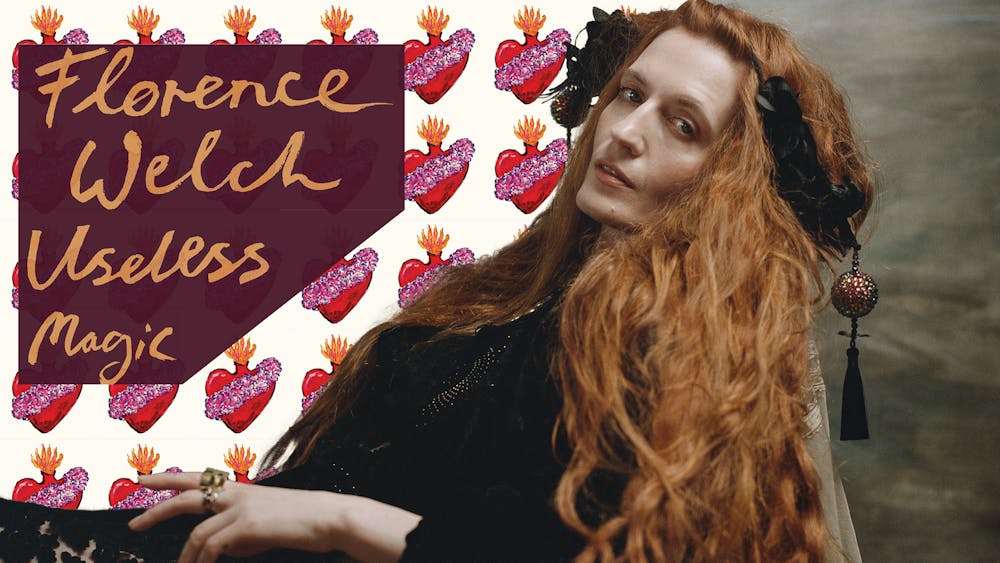Over the footsteps of heels, you hear cackling as Florence Welch sings a monotone, a cappella harmony that stratifies into an indistinguishable sound of spoken and sung voice: “I met the devil / You know, he gave me a choice / A golden heart or a golden voice.” Florence + the Machine’s new album, Dance Fever, is threatening—a presence you can feel but can’t see. For the first time after her premier poetry book Useless Magic: Lyrics and Poetry was published, Welch’s new album comes with three “poem versions” of songs, literally challenging the lines between lyricism, vocals, and verse.
Dance Fever can be described by its opening track, “King,” with bass notes that are more vibration than anything, a ghostly choir and drum beat, and Welch drifting on a shallow vocal fry different than her usual lush vibrato. Then, it inevitably blossoms into a guttural saxophone and the sparkling strings of a harp that call for a dance break. Immediately, she welcomes you into a dark space of worship—and we are ready for her to take us into a different room of each song through her vine–covered, black–laced abandoned cathedral of an album.
But now, imagine the song stripped down to nothing but the pluck of an electric guitar and Welch’s speaking voice. In “King (Poem Version),” she delivers the lyrics like a spoken word piece—breathy and intimate because she wants us to listen (or read) again.
Since Sappho and “lyric poetry” in ancient Greece, the relationship between sounds and storytelling is evolutionarily one and the same. Between Rolling Stone calling Bob Dylan a “literary genius” after receiving the Nobel Prize for Literature and Kendrick Lamar being the first rapper to win a Pulitzer Prize, the debate about songwriting and its literary value refuses to rest.
Although some adamantly defend the difference between musician and writer, Dylan himself demonstrates the manipulation between singing and speaking. When lyrics are so heavy with imagery, dialogue, and storytelling, they naturally make the musicality of a song more conversational.
On Welch's Dance Fever, the foundation of most songs is a drum beat, like the sound of feet banging on the floor above you. The orchestration surrounds you, with echoey voices you can’t make out, and the actual notes are like a thin layer of fog. All of this just barely makes a musical shape so that the melodies have a step–like, chromatic motion like inflections of someone speaking. In the song “Choreomania,” the intro is spoken in such an articulate and theatrical way already that the transition into singing goes almost unnoticed.
In “My Love (Poem Version),” other than the occasional strumming of a harp, Welch delivers its lyrics like a monologue in the present tense. It’s a thought process where even the repetition of a chorus doesn’t feel forced—just an increasing urgency that would have been told through instrumentation instead. As Welch said about her book, “The poetry has turned out more revealing in lots of ways than the songs. The songs can be quite grand … Poetry can sometimes be more matter of fact.” And even when she puts notes to words, she uses the tonality of speaking that is already embedded in music. On specific words, like in the song “Free,” the word “sensitive” floats on a vulnerable, precarious high note, reflecting the definition of the word itself.
In original Ancient Greek lyric poems played on lyres, lyrics could be a few lines or a series of verses—far from the ABABCB (verse, chorus, and bridge) formula today. However, in contrast to the often formulaic nature of song making today, Dance Fever is actively breaking the expected structure of a song. There can be up to four verses before a bridge in songs like “Daffodil,” a sprawling song that is queued next to interludes like “Restraint,” which spans the length of only two lines.
The album itself is like the fire of the Library of Alexandria. Similar to how we more greatly value the library's ancient knowledge due to the fact that much of it has been lost or destroyed, Dance Fever is made up of both whole pieces and fragments that resonate with us because of the album's elusiveness (Not to mention that the final poem version on the album, “Cassandra (Poem Version),” was directly inspired by the Greek myth about the identically named Trojan priestess).
The album’s promotional aesthetic is gilded into a regal display. On her throne, Welch bridges the realms of poetry and lyricism through music. In the final song, “Morning Elvis”—a slow obituary through the lens of her own abusive and toxic relationship with music—she sings, “But if I make it to the stage / I’ll show you what it means / To be spared.” With the warping sound bite of an audience cheering her on, Welch has crowned herself the new “King.”







